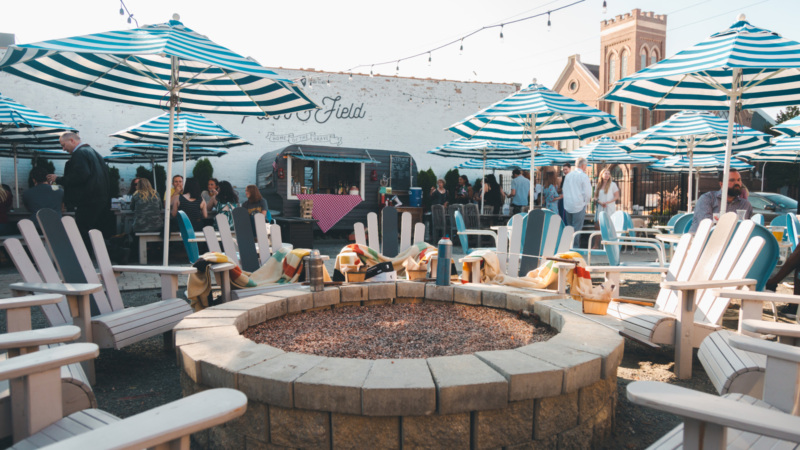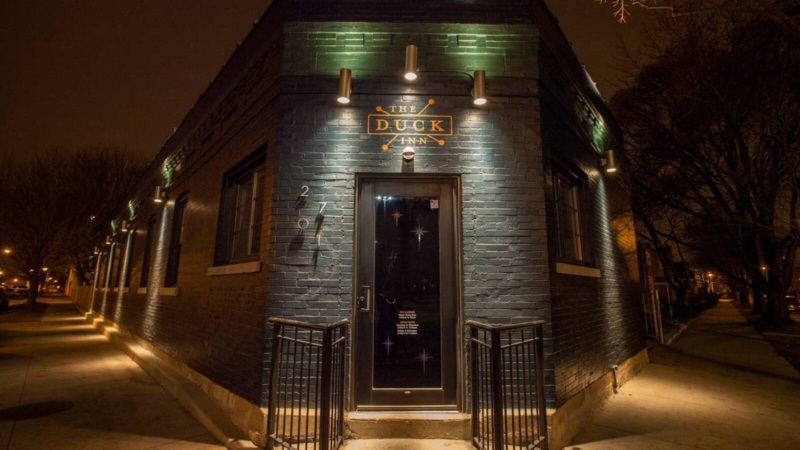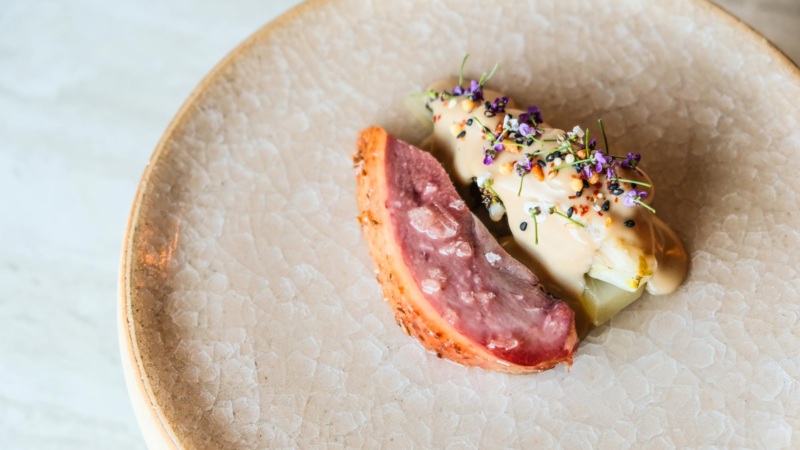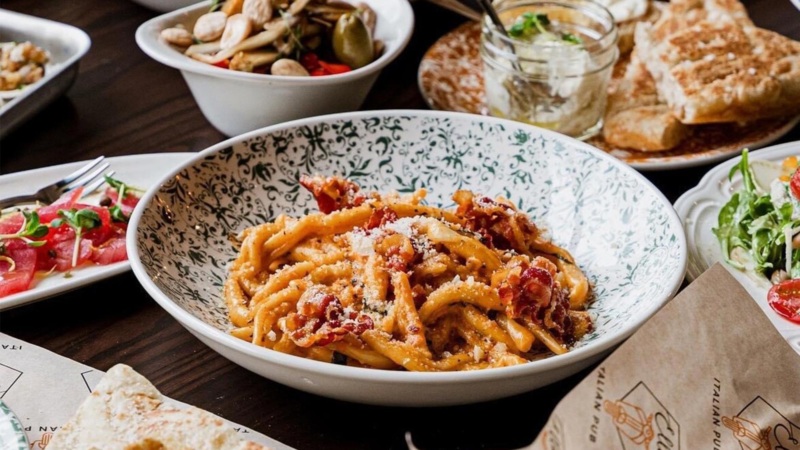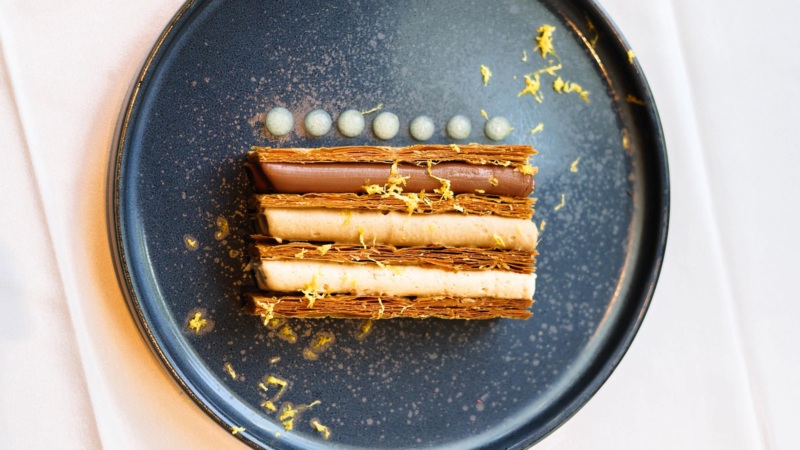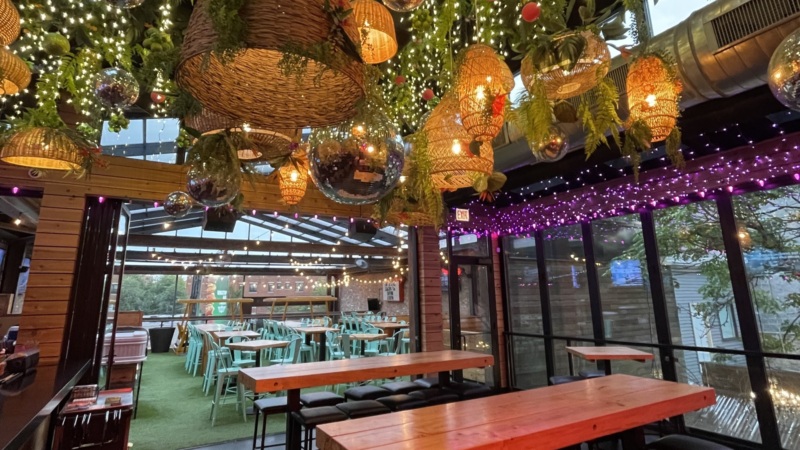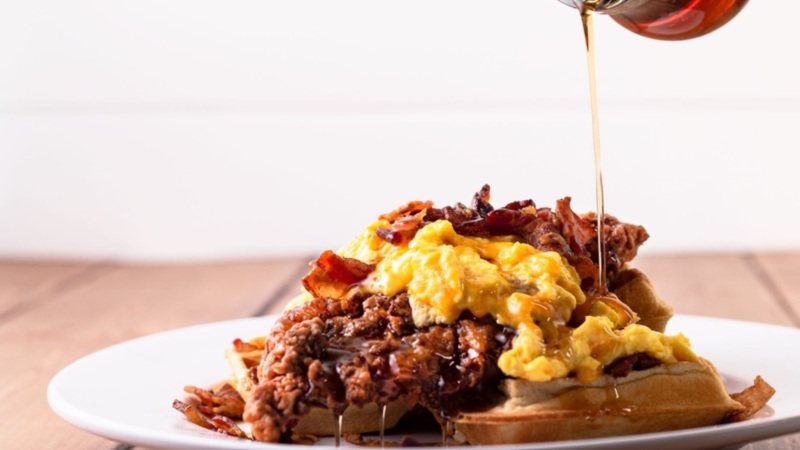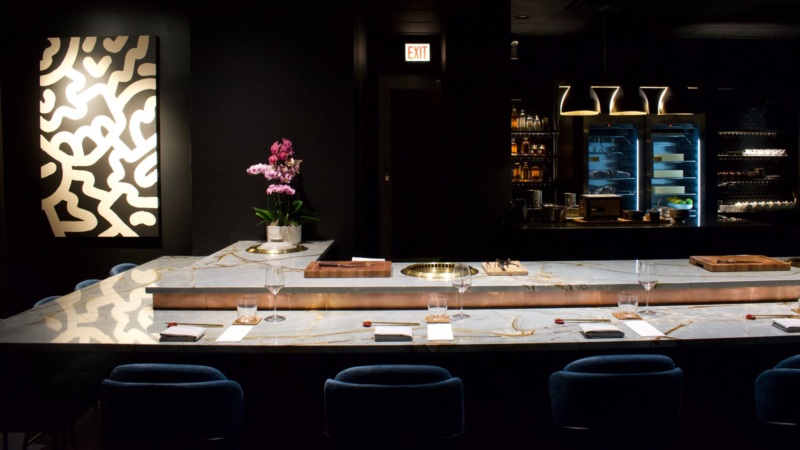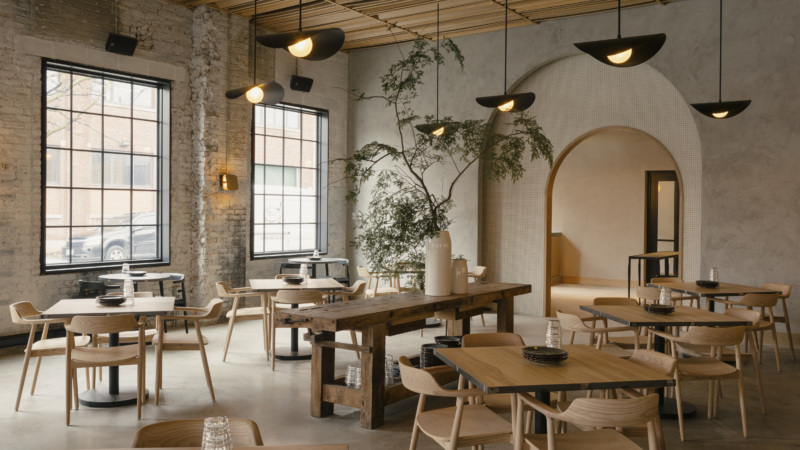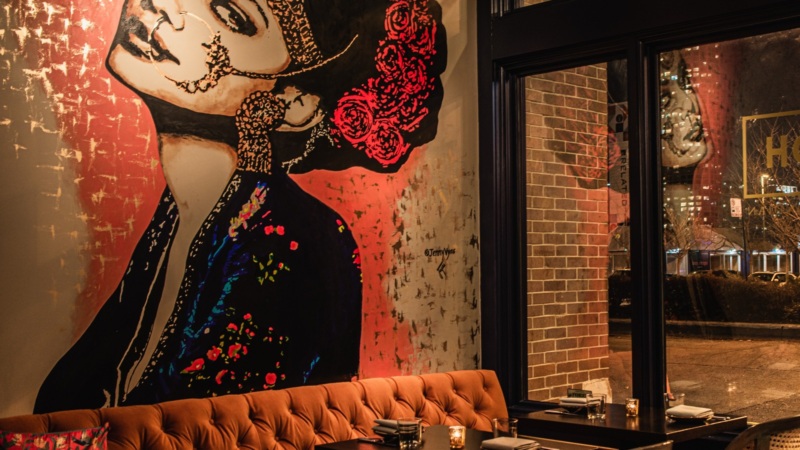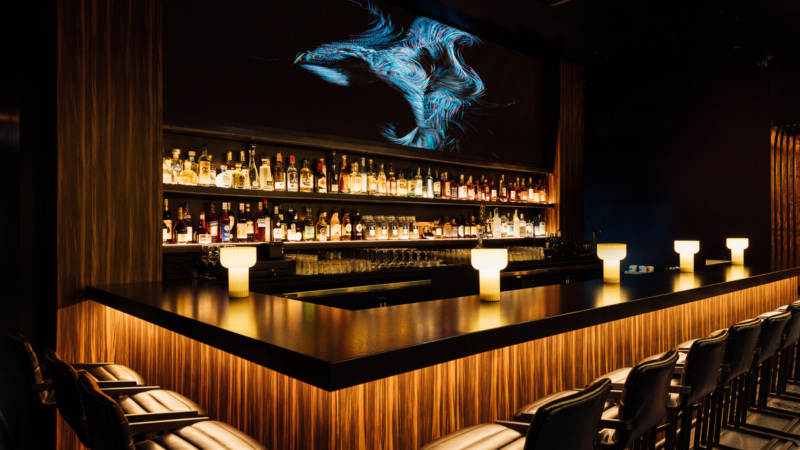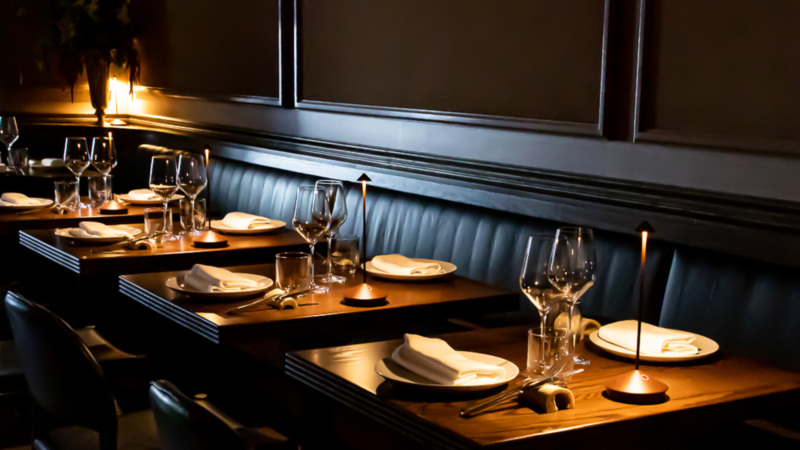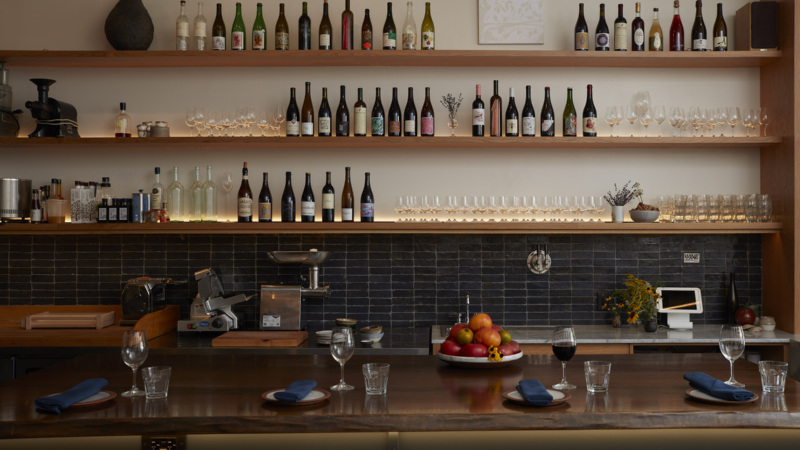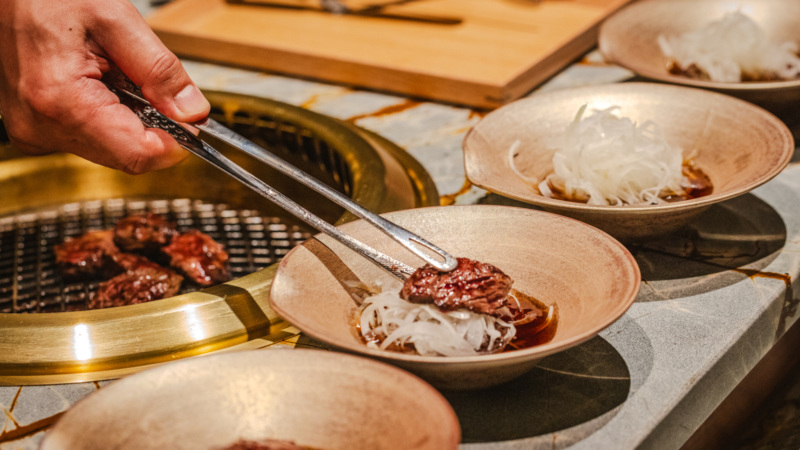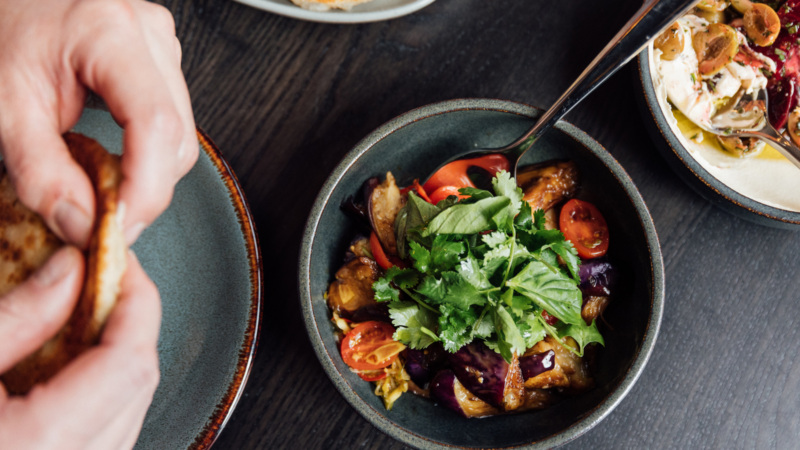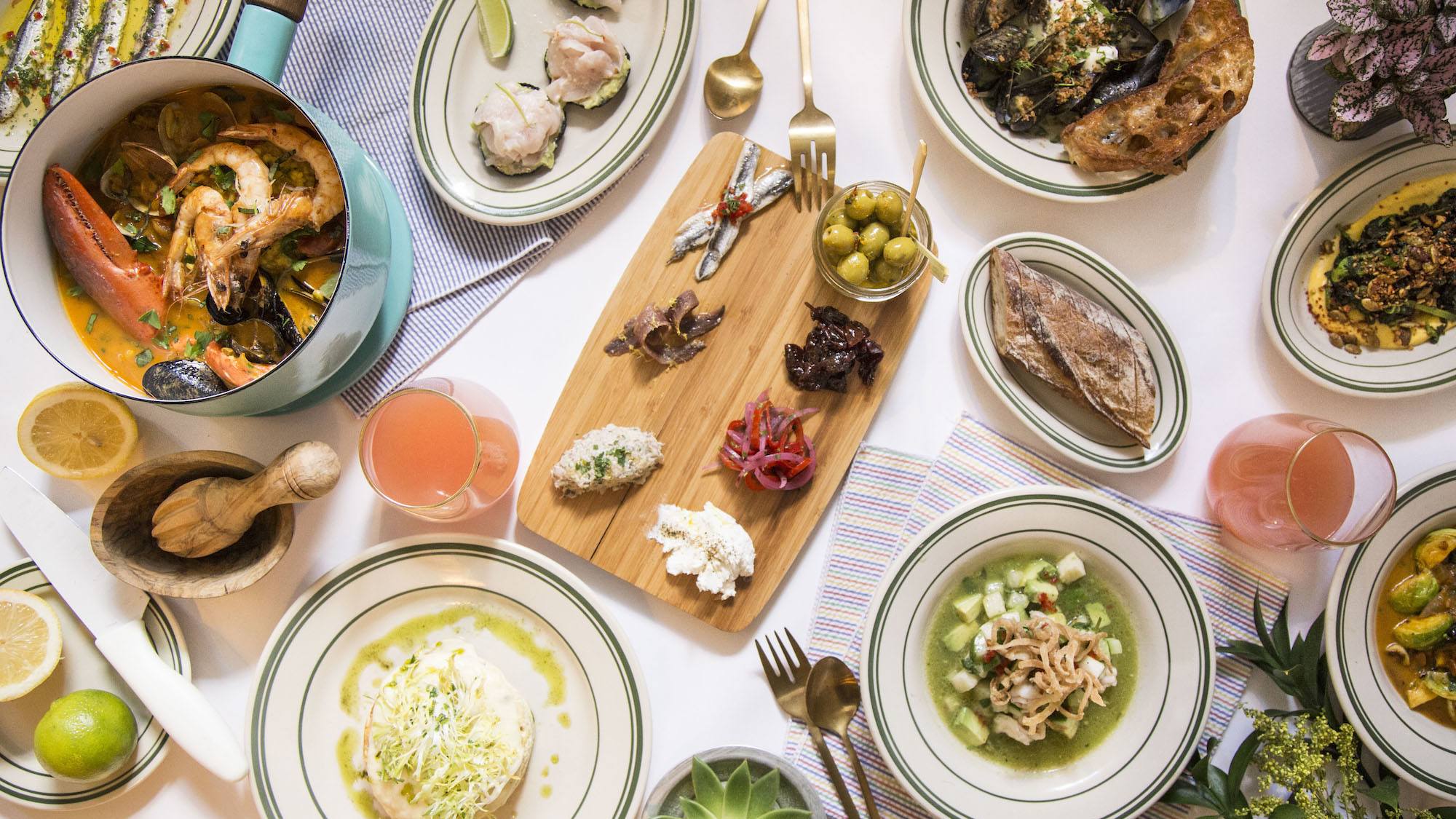
In a Changed World, mfk Seeks to Redefine the Neighborhood Restaurant
Married restaurant veterans Scott and Sari Worsham have, collectively, clocked some 60 years in the restaurant business. In the seven they’ve been owners, they’ve sought to create everyday spots serving special food — without the egos that so often command attention and media praise. They began in 2014 with mfk, a 20-seat subterranean boîte serving straightforward coastal Spanish fare in East Lakeview.
The whitewashed little restaurant quickly wove itself into the neighborhood fabric — amassing citywide and national critical acclaim. Among its many laurels, mfk has maintained a Bib Gourmand designation from Michelin every year since opening.
The Worshams followed with fun-loving Bar Biscay in 2018 — which poured draft G&Ts and vermut, alongside delicious shareables from the seaside towns in Spain’s Basque Country and along France’s western shores. When the pandemic hit last March, Biscay was among the city’s first and cleverest pivots — transforming into aptly named Bodega Biscay, and selling everything from housemade empanadas to laundry detergent. COVID and other factors finally forced Biscay’s closure in August 2020. But mfk clung to life, thanks to government assistance and the team’s stubborn resolve.
As this long, dark year slowly brightens, the Worshams have been readying mfk for a return to full-service dining in mid-June, with a fresh coat of paint and menu of old favorites — plus some yet-to-be-revealed newcomers — from head chef Matt Ginsberg.
We caught up with Scott Worsham on the real function of restaurants, the role of awards and stars, how to salvage some good from a long “broken” hospitality industry, and mfk’s stance on dining out post-vaccine..
You managed to build two honest-to-goodness neighborhood restaurants — in lovely mfk and lively Bar Biscay, may it rest in peace. Was that the intention from the start?
Scott Worsham: Thank you, that’s a lovely thing to say, and hear. Towards the end of the 2010s, I’d had a growing feeling that the lionization of the chef was getting out of hand. There are so many people that make a restaurant’s magic, and the media turned it into a one-man — usually only men — show. Sari was a (Charlie) Trotter army lifer, and she saw it, too. We had both fallen out of love with multi-coursed trips through someone’s childhood. We didn’t want to examine the chef’s psyche through his deconstructed Caesar salad. We just wanted dinner. But we also didn’t want to eat an inferior version of a caesar salad either.
It seemed like there could be a market for a simple, all-day place with good, dependable food, a solid wine list, and great service, which was harder than ever to find.
Fast forward a couple years. Sari and I take our first trip to Spain and we are blown away by the food scene. Except it’s not a “scene” for most Spaniards, it’s just normal, everyday food. We never went to any higher-end places, just neighborhood joints. We’re freaking out over how consistently good everything is, and for them it’s just Tuesday. It was a real eye-opener, a path forward for how we could do it back home.
So, then, what do you think is the true function of a restaurant?
I’m so happy someone finally asked me this question. The function of a restaurant is, for me, a gathering place for friends new and just met, loved ones, family, weddings, wakes, parties, and more parties — it’s supposed to be a part of the fabric of the neighborhood it’s in.
For me, a great restaurant is a miracle. It takes so much to make it work every day, it’s almost impossible. I see a lot of correlations between running a restaurant every day and filmmaking or theatre, for example. Maybe that’s one reason artistic types are drawn to it.
What it’s not supposed to be is a photo op that you move on from as soon as the next “Hot List” comes out.
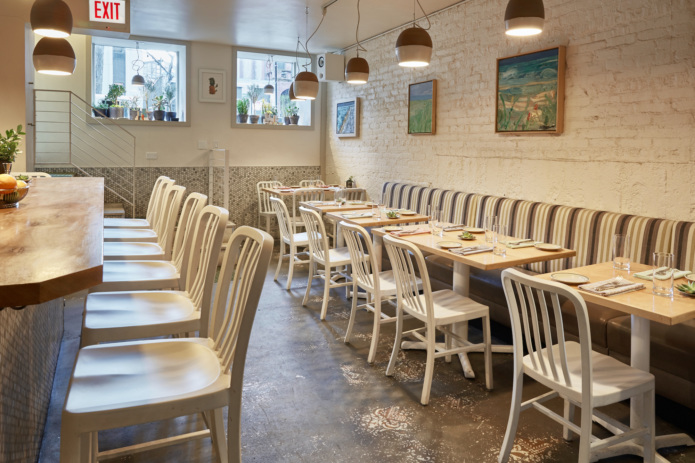
When Bar Biscay closed, you wrote the following, rather loaded, statement: “This pandemic has thrown a harsh light on truths we all pretend to accept but seldom act upon — that the future is unknown, that nothing lasts forever. Let’s try to salvage some good from this.”
Can you expand a bit on what you meant there?
This is a very big question for me: Why do we pretend that death isn’t real, and that life isn’t fleeting and precious? In light of this fact, human reactions feel rather inadequate much of the time.
That last line you quoted is about using this huge reset-button opportunity the pandemic gave us all to change our lives, and the way we do business, for the better. The restaurant business is broken. It’s built on a set of parameters from 100 years ago that no longer hold true. It needs to change.
People need to realize the true cost a restaurant entails. Menu prices have stayed relatively the same in the last 10-plus years while the cost of everything else has J-curved into space. In addition, we’re dealing with far more outside hands in a restaurant’s pockets than ever before. Delivery apps, for example, have taught me that when they say “disruptor,” I hear “We’re here to take some of your money and put you out of business as soon as we figure out how to take all of your money.” That is, ghost kitchens.
It’s a heady mix, and you don’t want to overwhelm guests who are just coming in for a decent night out. There is very little glamour in the restaurant business. I know it may seem somewhat glamorous to people looking in, but it’s mostly a slog. You have to have very strong personal reasons for doing it.
Unlike Bar Biscay, you closed down mfk for the first few months. When and why did it make sense to start doing pickup and delivery? How did you keep mfk going?
We started mfk back up for takeout when we realized that if we didn’t do something there was a good chance we would not have a restaurant to reopen in 2021. Then we got a PPP loan, which meant we could afford to do it. Otherwise, we probably would have closed for good. By that time, we also had a better grasp on what the virus meant, and how to more safely deal with it. In the beginning, it was much more unknown and frightening.
We were saved by the PPP loans, the EIDL, additional debt, and some other grants we applied for and received. I’d like to say we’re still here because we’re so smart, or because our large format Manhattans were such a hit, but the bald truth is that we’re still standing due to government assistance, and our own persistence. Our sales, frankly, were dismal. The assistance meant we could keep a core team together, which has gotten us to wherever we are now. We’re extremely grateful.
Let’s talk about reopening mfk. To the point of your statement when you closed Biscay, what is the good you’ll salvage with your re-entry to full service? What are you changing? What will stay with you after the past year, and amid the reckoning the hospitality industry is still facing?
We have some inherent challenges at mfk, mostly due to our limited size. We’re 700-plus square feet, including the kitchen and restroom. The only way we see a path forward right now is to keep labor costs as low as possible, while still paying our staff livable wages for city living. That means our menu prices have to be adjusted accordingly. There’s no other way to do it.
We’re trying to ensure that both our staff, and Sari and I, have a tenable work-life balance. That means dinner service will be reservation-only, four nights a week, for the foreseeable future. Four days on, three days off, 48 weeks a year.
We also need to offer health insurance for all employees. That means there’ll be a surcharge for health insurance purposes. We thought about building that into the menu prices, but our guests would get taxed on that as well, which is uncool. Whether people understand that or not is up to us to communicate as best we can.
We’re working on all of this right now for the reopen. I don’t know if we should continue as a business if we can’t do these things.

And what about your decision to ask that customers are fully vaccinated — and to bring their cards, if needed — before coming in. Why is it important to explicitly require that?
The new now is forcing us to choose between being the mask police or the vaccine police, so we’ve chosen the latter. They both suck, but we have no choice. It’s pretty simple: We’re inviting people into our home. When you go to other people’s homes you follow their rules with no complaint — otherwise you don’t go — so why is a restaurant, or any other private business, any different?
Also, if you’re against vaccines, you probably won’t like us. Stay away.
What can we expect food-wise? Old-friend dishes? Anything you want to call out in particular?
The menu hasn’t been carved in stone yet, but look for some dishes from the beginning of our menu that I really miss, hopefully making an appearance, like monkfish liver paté and cataplana (Spanish seafood stew). There are some staples we cannot lose — like Cantabrian anchovies, Spanish tortilla, albondigas, ceviche — and there are some new things we’re excited about that I’m not going to talk about yet.
Our head chef, Matt Ginsburg, has been working in our kitchen for three years now, quietly making his way up the ladder. He’s thoughtful, cool-headed, seemingly tireless, and he has an amazing palate. We’ve got Archie Powell (mfk 1.0 and Bar Biscay) slinging beverages, and he’s one of my all-time favorite humans and barmen. He understands complexity — when to use it and when to avoid it. [He understands] a well-balanced cocktail, and can steer you, with astonishing accuracy, into your new favorite wine that you’ve never heard of. And last but not least, our dear friend and the former GM of Bar Biscay, Neal Neumann, will be running the show. Neal is an excellent human, and we are very happy he returned to lead us all into glory. Or abject failure. It’s anybody’s guess right now.
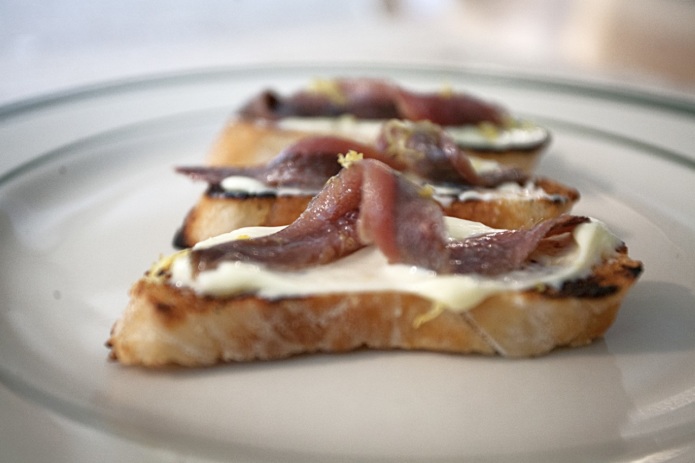
And how does it feel to think about creativity again in the restaurant?
Honestly, in regards to restaurants, I had no creative juices a few months back. I was feeling chewed up and spit out by this business for most of this last year. It wasn’t until we started rebuilding mfk that the old fire came back. I dearly love the design process of building the room. If that doesn’t get you excited to see people in it, nothing will. I can’t wait to see people in mfk again, and I thank Sari for not letting me quit.
When we feel safe enough to pass the porrón around a room full of strangers again, I’ll know we’ve made it to the other side. I cannot wait for that day.
What did it mean to maintain the Bib Gourmand in a year you were in survival mode? How do you feel about stars and awards, and the role they should play for restaurants going forward?
It’s always lovely to win an award, that’s the truth. And we are happy and grateful to have received a Bib Gourmand this year to keep our streak going. It does mean something to us. It may not drive business the way it did in the past, but it feels good to be recognized for being consistent. That’s a key component in any good restaurant, maybe the number one thing, in my book.
I’m not trying to belittle the award, but it does feel weird that they were done this year.
That being said, it would have been appropriate for all the businesses that rely on restaurants for their income to have taken a pass on last year. I realize they have employees too, but many of those companies have extremely deep VC pockets — unlike 99 percent of the restaurants they make their living off of. Some did, but many did not.
Assigning “worth” is kind of dumb anyway, but it feels somewhat cruel in light of the pandemic. In my review book for this last year, any restaurant still standing should get stars for life.
This conversation has been lightly edited for length and clarity.
Maggie Hennessy is a Chicago-based restaurant critic and food writer, whose work has appeared in such publications as Eater, Plate, Food52, Wine Enthusiast and others. Follow her on Instagram and Twitter. Follow Resy, too.

